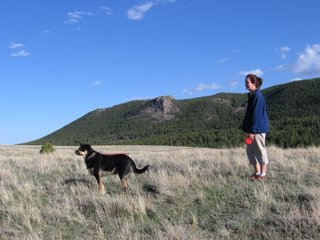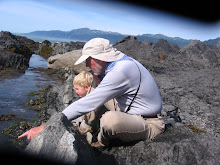Lessons Learned

Lessons learned
Elmo is still trying to learn a few things; at least I think he is trying. Occasionally he stays next to us on the trail instead of charging the person coming the other direction. I have explained that most of those people are not aware that his tail is wagging, and that all he wants is a rub and reassurance that he is the most lovable dog in the world. I have even explained that some of them may actually be afraid of him, a concept that he still fails to grasp.
When he does stay, he also looks up and smiles at Annie and me, like he is really proud of what he has done.
Annie and I are also learning and wandering helps us learn. Like Elmo, we look up and smile because we are proud of learning these lessons. However, realization of lessons learned comes to us slowly like a form out of the fog finally recognized. We are confident that there will be others, but here are the ones that have already emerged.
1. It is OK to turn around. Focus on the destination causes us to miss things that should not be missed. We might be flying down the highway concentrating on the Rush Limbaugh show (just kidding) and miss the turn to
2. Take the next right. The unplanned adventure may be the best. On a whim we turned off the
Even better would be to get lost and not worry about it.
3. Avoid Cities. As we became more comfortable in the wilderness, we became less comfortable in cities. Villages were OK, even small towns, but cities made us uncomfortable. We usually picked the city for motel night. Sometimes we would hide in our motel room until we could get up and wander on down the road. Entering the city was like an overdose of caffeine or the onset of the flu. We knew something was wrong but were not sure why. Now we know, it is the city; too many streets, too many cars, too many people in a hurry, too much dirt and garbage and fear and stress. In the city we were lost; not the external kind of lost that sharpens one’s senses and thrills with adventure, but the discouraged lost that takes permanent residence in the heart.
4. Call of the wild. Wild places sing a siren’s song that we both hear. That song, for many years, has been unrecognized background music in our lives. Now it is surround sound, like the base emanating from the low-rider hunching down the loop two miles away and rattling the pictures on the wall. And we have no mast or rope.
5. Wander slowly. A baby moose, crossing the highway behind his mother, clops along on his stilts. Red lichen grows on a granite rock next to an icy blue lake. A river foaming and crashing over boulders races down the mountain. A pretty girl at a rest stop points to the eagle hunkering on a naked limb at the top of the dead spruce next to the picnic table. We see none of these from 40,000 feet inside the skin of a Bowing 747.
We don’t hear the Eagle’s screech or smell the flavor of the forest floor or feel the icy sting of the glacier river at seventy miles an hour from inside the Highlander.
The little birds don’t gather overhead when one is struggling up a wilderness trail, and the red fox next to the water who watches us maneuver the raft through the difficult rapids remains unseen.
Probably the best way to wander is to sit; at least most of the time.
6. The back of a Highlander will hold all one needs to live well. “Remember when we could get everything we owned in the back seat of the car?” That is a quote from everyone. We have all said it, usually with nostalgia and longing shortly after digging through several piles of crud that was not needed when bought, hasn’t been used in the last twenty years, and would most likely be rejected by Goodwill. Life piles up around us like climber’s discards on
We were reminded that we really don’t need much stuff to have a very good life. We lived six months, six great months, on what we could squeeze into the Highlander. OK, OK we did have the car top carrier filled as well. The only thing we both missed was the salad spinner. I hope that we will remember the joyful simplicity of less.
7. There were good reasons for Anne and Tim to marry. I realize that this lesson could have gone the other way. We might have learned that there were no reasons. Fortunately that was not the case. In the last six months, we have spent more time together than we did in the first forty-one years of marriage.
We did have one brown out. At Liard Hot Springs rain started about the time we needed to cook. If it had been two degrees colder it would have been snow. I was in a good mood. I built a big fire, got out the umbrellas, set chairs by the fire, and tried to coax Annie out of the tent by convincing her how great the experience was. Most of you can imagine the result of my enthusiasm. We survived that and there were no others; probably the least conflict in any six month period of our marriage.
We were also reminded that we like each other. We have fun together. We like doing the same things. We love nature and the beauty of God’s creation. We long for our grandchildren and great grandchildren to have the opportunity to experience that beauty. Wild majesty is spiritual to both of us.
I found a poem yesterday that I had written to Annie on one of her birthdays. It says why I like wandering with Annie. She said I could share it.
Chips and Salsa
By Tim Banks
You are how I feel
When I remember the smell
Of bread baking
Or see a basket of chips
And a big bowl of salsa
Waiting on the table.
Knowing you is like being surprised
By the perfect sunrise,
There when you turn back,
Draped and glowing sunrise colors
Across the bottom of dark gray clouds
Loving you is being caught
When about to fall or
Snuggling warm and cozy
Under piles of cover
When the cold wind blows
Rain drops against the window pane.
You loving me is life
Like air and water
Our souls wrapped in one another
Forever.

